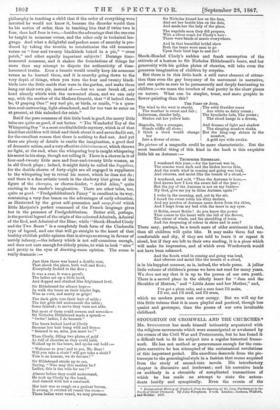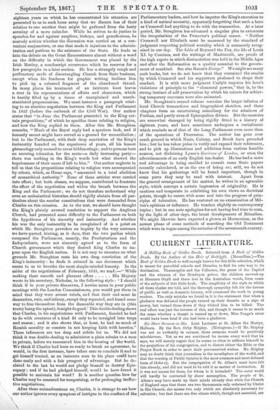STOUGHTON ON CROMWELL AND THE CHURCHES.* Mn. STOUGHTON has made
himself intimately acquainted with the religious movements which were emancipated or awakened by the events of the Civil War and Protectorate, but he has found it a difficult task to fit his subject into a regular historical frame- work. He has not method or perseverance enough for the com- plete narrative he has attempted of the ecclesiastical revolutions of this important period. His exordium descends from the pic- turesque to the genealogical style in a fashion that seems acquired from the study of second-rate novels. His introductory chapter is discursive and irrelevant ; and his narrative lands AIS suddenly in a chronicle of complicated transactions of which he has made no attempt to state the antece- dents lucidly and synoptically. Even the events of the Ecclesiastical Bistory of Engkaut, front the Opening of the Long Parliament to the- Death of Oliver Cromwell. By John Stoughton. 2 vols. London: Jackson, Watord, and Hodder. 1867.
eighteen years on which he has concentrated his attention are presented to us in such loose array that we discern less of their relation to one another than might be gathered from the hasty scrutiny of a mere calendar. While he strives to do justice to speeches for and against surplices, bishops, and genuflexions, he scarcely notices whether the discussion was carried on at a con-
venient conjuncture, or one that made it injurious to the adminis- tration and perilous to the existence of the State. He leads us
into the debate on the Great Remonstrance almost without a word on the difficulty in which the Government was placed by the Irish Mutiny, a nondescript occurrence which he reserves for a few paragraphs in a later section. He has a strangely rough and perfunctory mode of disentangling Church from State business, except when his fondness for graphic writing inclines him to pick up a coloured fragment of the abandoned thread. In many places his treatment of an intricate knot leaves a rent in his representations of affairs and characters, which is hastily filled up by a tissue of unexplained and unsub- stantiated prepossessions. We must instance a paragraph relat- ing to an abortive negotiation between the King and Parliament in 1642 (before the outbreak of the Civil War). Our author states that "in June the Parliament presented to the King cer- tain propositions," of which he specifies those relating to religion, and how the King replied to them. After this Mr. Stoughton remarks, "Much of the Royal reply had a specious look, and if honestly meant might have served as a ground for reconciliation ; but to the Parliament, with their deep conviction of the King's insincerity founded on the experience of years, all his honest phraseology only seemed to cover hidden stings ; and to persons bent on securing toleration for the sects—a daily increasing party— there was nothing in the King's words but what showed the hopelessness of their cause if left to him." Our author neglects to tell us that the propositions relating to religion were accompanied by others, which, as Hume says, "amounted to a total abolition of monarchical authority." None of these articles were carried into effect ; but both classes, we suppose, contributed to frustrate the effect of the negotiation and widen the breach between the King and the Parliament ; we do not therefore understand why even an ecclesiastical historian should rigidly abstain from all par- ticulars about the secular constitutions that were demanded from Charles on this occasion. As to the rest, we should have thought the King's plainly avowed resolution to support the Anglican Church, had presented some difficulty to the Parliament on both the hypotheses of his sincerity and insincerity. And whether his was the only insincerity to be complained of is a point on which Mr. Stoughton provokes an inquiry by the very sentence we have quoted, hinting, as it does, that the two parties which composed the Parliament, namely, the Presbyterians and the Independents, were not sincerely agreed as to the form of Church government which they desired King Charles to fin- pose upon the English nation. It is not easy to examine on what grounds Mr. Stoughton rests his own deep conviction of the King's insincerity : he finds it evinced in one document which seems to us to breathe the most simple-minded honesty. In the midst of the negotiations of February, 1615, we reed:—" 'While
making them smooth and pleasant offers His Majesty wrote to his secretary, Nicholas, in the following style : I should think if in your private discourses, I nowise mean in your public meetings with the.London Commissioners, you would put them in mind that they were arrant rebels, and that their end must be damnation, ruin, and infamy, except they repented, and found some way to free themselves from the damnable way they are in (this treaty being the aptest), it might do good.' This double dealing shows that Charles, in his negotiations with Parliament, fancied he had to do with creatures of a kind fit only to be inveigled into traps and snares ; and it also shows that, at least, he had so much of Romish morality as consists in not keeping faith with heretics." These inferences are too deep and subtle for us. We did not think it was double-dealing to administer a plain rebuke to a man in private, before we renounced him in the hearing of the World. We think if Charles had been so ready to break an agreenient, he would, in the first instance, have taken care to conclude it and to get himself trusted, as an insincere man in his place could have done easily and with a fair prospect of advantage. But he de- clared to the last he would not pledge himself to destroy Epis- copacy; and if he had pledged himself, would he have found it possible to maintain his word ? It is another question hbw far Charles may be censured for temporizing, or for prolonging ibeffec- tive negotiations.
After these animadversions on Charles, it is strange to see how our author ignores every symptom of intrigue in the conduct of the
Parliamentary leaders, and how he imputes the King's execution to a kind of natural necessity, apparently forgetting that such a hero as Cromwell had anything to do with the transaction. At a later period, Mr. Stoughton has advanced a singular plea to extenuate the irregularities of the Protector's political career. "Neither Cromwell nor Elizabeth must be measured by the standard of judgment respecting political morality which is commonly recog- nised in our day. The fable of Reynard the Fox, the life of Louis XI. by Comines, and the writings of Machiavelli, are proofs of the high repute in which dissimulation was held in the Middle Ages and after the Reformation as a quality essential to the govern- ment of mankind. See also Bacon's Essays." We might see many such books, but we do not know that they containel the oracles by which Cromwell and his supporters professed to shape their conduct. It is with more judgment Carlyle imputes his hero's violations of principle to the "elemental powers," that is, to the strong instinct of self-preservation by which his talents for achiev- ing temporary successes were also animated.
Mr. Stoughton's second volume contains the larger infusion of local Church transactions and biographical sketches, and these chapters form an entertaining miscellany for the admirers of Puritan, and partly even of Episcopalian divines. But the memoirs are somewhat damaged by being rigidly fitted to a history of eighteen years, and have sometimes undergone a curtailment which reminds us of that of the Long Parliament even more than of the operations of Procrustes. The author has gone over much ground in which Neale, Calamy, and Brook have preceded him ; but he has taken pains to verify and expand their references, and to pick up illustrations and additions from various humble sources, not disdaining Lyson's Environs of London, or even the advertisements of an early English tea-dealer. He has had a more real advantage in being enabled to consult some State papers recently calendared, or on the eve of being so ; still, we do not know that his gatherings will be found important, though in
some parts their may be read with interest. Apart from the general arrangement of his matter, he writes in an agreeable style, which conveys a certain impression of originality. He is cautious and temperate in exhibiting his own views on doctrinal points, though he enters with some zeal into the progress of prin- ciples of toleration. He has ventured on no examination of Mil- ton's opinions or influence. He touches slightly on contemporary topics ; but in one note apologizes for not having had time to scan, by the light of other days, the latest developments of Ritualism. We might likewise have expected a glance at Mormonism, as the newest phase of some methods of searching the Old Testament which were in vogue among the sectaries of the seventeenth century.































 Previous page
Previous page